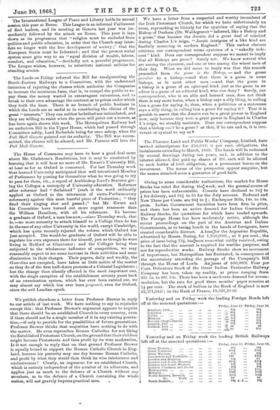We have a letter from a respected and worthy incumbent
of the Irish Protestant Church, for which we have unfortunately no room, reproaching us bitterly for the cynicism of saying that the Bishop of Durham (Dr. Waldegrave) "inferred, like a Bishop and a goose," that because the Jesuits did a great deal of mischief during Charles L's reign, "Jesuit intrigues of a like kind are fearfully menacing in modern England." This rather obvious criticism our correspondent terms cynicism of a "nakedly inde- cent" kind. Does our correspondent suppose we meant to imply that all Bishops are geese? Surely not. We know several who are among the cleverest, and one or two among the wisest men of their day. What we did mean to imply was that this remark proceeded from the goose in the Bishop, — and the goose peculiar to a bishop :—and that there is a goose in some bishops, as in most other men :--and that the goose in a bishop is a goose of an episcopal kind, just as the goose in an editor is a goose of an editorial kind, who can deny ? Surely, our correspondent, who is an able and learned man, does not think there is any more harm, when a bishop says a silly thing, in calling him a goose for saying it, than, when a politician or a statesman says a silly thing, in calling him a goose for saying it? That it is goosish to assert that the Jesuits can be a great power in England now, only because they were a great power in England in Charles I.'s reign, we steadily maintain. Does our correspondent suppose that a bishop can't be a goose ? or that, if he can and is, it is irre- verent or cynical to say so la


































 Previous page
Previous page